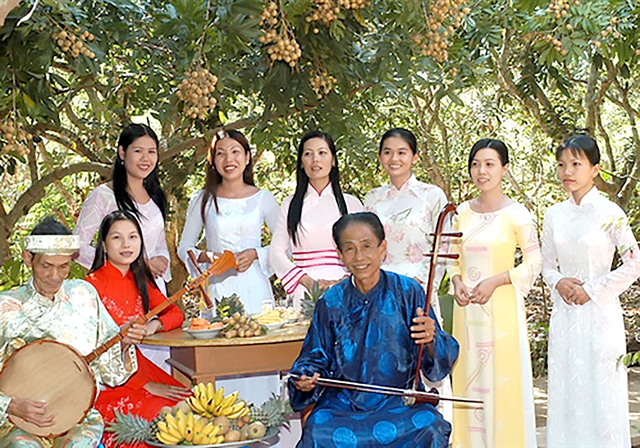 Life & Style
Life & Style

A book featuring đờn ca tài tử (Southern folk music) and vọng cổ (nostalgic tunes) has been released in HCM City.

|
| SONGS OF THE SOUTH - Artists perform vọng cổ (nostalgic) songs about Southern culture and lifestyle. Farmers in the Cửu Long (Mekong) River Delta region often sing songs while working in the fields or at traditional festivals and weddings. Photo courtesy of the HCM City Theatre Artists’ Association |
HCM CITY — A book featuring đờn ca tài tử (Southern folk music) and vọng cổ (nostalgic tunes) has been released in HCM City.
The book, Tìm Hiểu Âm Nhạc Tài Tử và Cải Lương Vọng Cổ-Ghitar Phím Lõm (Learning Southern Music-Traditional Instruments), was written by cultural researcher and musician Kiều Tấn of HCM City.
Tấn has studied the traditional culture, theatre and music of southern Việt Nam for several years.
His book focuses on the history and developments of đờn ca tài tử in different periods. Vọng cổ songs in praise of life and love are also included.
The book features traditional instruments, such as the kìm (two-stringed guitar), cò (vertical violin with two strings), tranh (16-chord zither) and bầu (monochord zither).
Lục Huyền Cầm, a Vietnamese guitar with six strings and scoops on the fingerboard mostly used in singing vọng cổ, is highlighted.

|
| NEW BOOK - Cultural researcher Kiều Tấn and his new book features đờn ca tài tử (Southern folk music) and vọng cổ (nostalgic tunes). Photo courtesy of HCM City General Publishing House |
“Cultural researcher Kiều Tấn, who is also a music player and theatre producer, has 40 years in the industry,” said theatre critic Thanh Hiệp of the HCM City Theatre Association. “His new book, Tìm Hiểu Âm Nhạc Tài Tử và Cải Lương Vọng Cổ- Ghitar Phím Lõm, features the South’s traditional music but also its culture and lifestyle.”
Đờn ca tài tử originated in southern Việt Nam 100 years ago. It is often performed during festivals and special occasions in the Cửu Long (Mekong) Delta provinces of Cần Thơ, Long An, Vĩnh Long, Bạc Liêu and Cà Mau.
In 2013, the music was recognised as an Intangible Cultural Heritage of Humanity by UNESCO.
Vọng cổ songs feature the hopes and dreams of southern farmers in the Cửu Long (Mekong) River Delta region, who often sing songs while working in the fields or at traditional festivals and weddings.
They are also used in cải lương (reformed opera) plays.
HCM City has 84 clubs of đờn ca tài tử, attracting more than 500 members. These clubs offer training courses on vọng cổ singing and playing đờn ca tài tử. They also help to bring traditional arts closer to young people.
The city has offered policies and given financial support to help tài tử clubs boost their operations and quality. Outdoor performances have also been launched monthly at cultural centres, parks, and residential areas around the city.
Tấn's book was printed and distributed by HCM City General Publishing House. — VNS